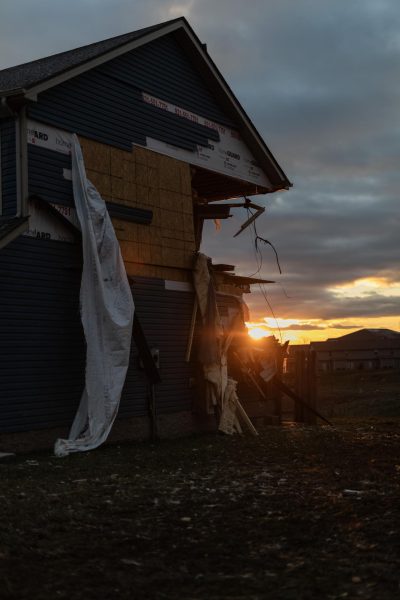A Look Back at Ketanji Brown Jackson’s Career After Her Historic Supreme Court Confirmation
On Thursday, April 7, The Senate voted 53-47 to confirm Ketanji Brown Jackson to serve as the first Black woman on the United States Supreme Court. It’s a historic moment and one that’s had a good deal of lead-up and attention from Jackson’s senate hearings in recent weeks.
Reyna Herrera, president of the Women’s Law forum at Southern Illinois University (SIU), said she believes that the new opportunities for diversity Jackson will bring with her to the court will be valuable.
“Although the Supreme Court has gotten more diverse over the last few decades, the Court is still predominantly white males,” Herrera said. “I think it is important to have a racially and ethnically diverse Court that represents the United States because that ensures that everyone’s voices will be heard.”
Advertisement
Jackson is set to replace outgoing Supreme Court Justice Stephen Breyer as soon as he retires this summer.
Like many law practitioners before her, Jackson spent several years studying at Harvard Law, eventually graduating with a Law degree in 1996. One of the most notable moments in her time at Harvard was when a fellow student hung a Confederate flag from the window of their dormitory, prompting Jackson and several others to protest.
Jackson spent several years working as a clerk for various judges in Massachusetts and Washington D.C. after graduating Harvard, before serving as a clerk to the judge she would eventually be nominated to replace, Stephen Breyer.
While her clerkship did matter by allowing her to establish connections in Washington, what arguably sets Jackson apart from the rest of the current judges in the Supreme Court is the time she spent as a public defender. She spent two and half years representing clients who were unable to afford private lawyers. She will be the first Supreme Court Justice with this kind of experience since Thurgood Marshall retired in 1991.
Politicians championing Jackson’s experience argue the time spent defending poor and vulnerable defendants would put her in a better position to rule in cases affecting the public than the rest of her peers. Those opposed to Jackson’s nomination argue that this experience may cause her to make rulings perceived as being “light on crime.”
Herrera says she believes Jackson’s prior experience in public defense could be a valuable asset.
“Being a public defender means long hours and intense cases with sometimes very little reward,” Herrera said. “I believe the work ethic and mindset required to be able to handle that job will translate well into the role of a Justice on the Supreme Court.”
Advertisement*
During her time in public defense, another highlight of Judge Jackson’s career was the time she spent at Guantánamo Bay, the highly controversial military detention camp that’s been used to contain suspected and confirmed terrorists from the U.S.’s various wars in the Middle East with a long history of waterboarding and other forms of torture.
During her time there, Judge Jackson represented four defendants. Among the defendants were various enemy combatants accused of having connections with Al-Qaeda or the Taliban. All four defendants were eventually ruled to be not guilty and were transferred out to other countries.
Speaking on her role at Guantánamo, James Jones, president of the Black Law Student Association (BLSA), said her work at the detention camp should be separated from her political positions and endorsements.
“I believe her work at Guantanamo Bay is noteworthy only because of the crimes the defendants she represented were being charged with,” Jones said. “I do not believe that the work she did there in any way reflects her support for those crimes. Her work was exactly what we expect from every criminal defense attorney. Our adversarial system of justice doesn’t work without zealous representation on both sides.”
In the span of four years, Jackson went from private practice at a D.C.-based law firm to the D.C. court of appeals, which she joined with bipartisan support after being nominated twice by President Barack Obama. The D.C. court is largely seen as the nation’s second-most influential court, only behind the Supreme Court itself.
At the hearing for her nomination in 2012, former House Speaker Paul Ryan, who is related to Jackson by marriage, had glowing things to say about her qualifications.
“Our politics may differ, but my praise for Ketanji’s intellect, for her character [and] for her integrity is unequivocal,” Ryan said. “She’s an amazing person, and I favorably recommend her consideration.”
Since her time at the DC Circuit court, Judge Jackson gained attention briefly in 2018 when she ruled that Don McGahn, a counsel to the then-president Donald Trump administration, must comply in testifying in the at-the-time ongoing probe into Trump’s connections with Russia, despite orders from Trump to do otherwise. She famously called out Trump, stating “presidents are not kings” and that “no one is above the law.”
It is also worth noting that Jackson sided with the Trump administration in 2019 in dismissing an environmental agency’s claims that the administration had overstepped its boundaries in building a border wall between Mexico and New Mexico.
Given a long line of experience, Daniel Asonye, president of the Law School Democrats, says he believes that Judge Jackson will be a valuable addition to the Supreme Court.
“Her experience at this point [is] head and shoulders above many of her peers at this point in her career,” Asonye said. “She brings a comprehensive perspective of our legal system, pre-trial, post-trial, appellate, criminal and civil. It’s really quite impressive, and I’m proud of the experience that she stands to bring to the Court.”
Staff reporter Ethan Braun can be reached at [email protected]. To stay up to date with all your Southern Illinois news follow the Daily Egyptian on Facebook and Twitter.
Advertisement














Glenda Cawthon • Apr 21, 2022 at 8:56 am
Don’t like picture of of Mrs. Brown Jackson. It doesn’t give me a realistic picture of the Women with these great accomplishments.
Thanks